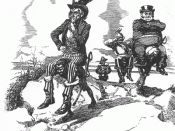Power-hungry European countries in the mid-19th century were all in competition over distant overseas colonies, which were vital to their survival. To maintain control over their colonies they also needed to control over their bases in order to keep troops and ships properly supplied and protected along their way. Such significant places were, for example, the Strait of Gibraltar and the Suez Canal. Although the goal of most European powers was wealth, others felt obliged to civilize and convert "backward" peoples of Africa and Asia. This is called "The White Man's Burden".
Despite the so-called attempts to civilize people and improve their lifestyles, these people were always considered inferior and were often mistreated. Most of their rights were taken away, if not practically enslaved.
On the other hand, Europeans greatly modernized some countries. They built many railroads, though mostly for their own benefits rather than those of the local people.
In India, the British did help civilize, from our point-of-view, the native culture. For example, they forbade religious human sacrifices. The local people were also given more of a European education and had to learn the language of the imperialist country. They were also converted to Christianity. But with these two things combined, the local people practically lost their own culture.
In Africa, cultures that have lived for many years in peace became fierce enemies after the arrival of the Europeans. In Rwanda this led to the biggest genocide the world has seen since World War II. Overall, European imperialism left all the formerly controlled countries in corruption and extreme poverty. In the Belgian Congo, millions of innocent people were massacred by the Belgian government. In South Africa imperialism resulted in shocking racism against all people of color.
European imperialism was very hypocritical and greatly worsened...


